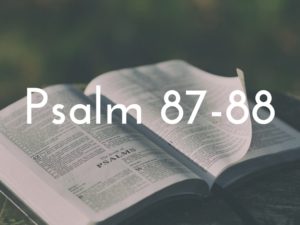Day 49 | Taylor Brill
Psalm 87
The meaning of the Psalm is not clear at first pass, but as we dig in, this is one of the more beautiful Psalms. Verses 1 - 3 describe a future Zion as the chosen city of God. It is on the holy mountain, loved by God and spoken of gloriously. This is the same place Revelation 14:1 describes:
“Then I looked, and behold, on Mount Zion stood the Lamb, and with him 144,000 who had his name and his Father’s name written on their foreheads.”
The next three verses, 4 - 6, are where it gets good. All of the nations described in v4 are (or were) enemies of Israel throughout their history. The references “this one was born in there” in verses 4, 5, and 6 are saying this enemy nation is apart of Zion. These verses speak to the inclusion of these enemy nations in God’s holy city. The Lord has established Zion for this purpose and ‘registered’ these people as citizens. The Psalm is implicitly saying what the new testament says explicitly: God’s enemies are included in salvation. The 144,000 that Revelation 14 describes includes people that historically and traditionally are ‘enemies of God’.
Psalm 88
I feel that this Psalm speaks for itself so I won’t draw any overarching conclusions but just offer some observations from this chapter for you to consider with your own meditations.
-
My commentary says “This is an individual lament, suited for a person who is so overwhelmed with troubles that even his friends shun him, and who wrestles with the dread that comes from suspecting that The Lord has shunned him as well.” That last part of the sentence resonates with me. It may for others in the community as well.
-
This Psalm is unique in that it offers no ray of hope. Usually, there is at least a “yet I shall trust in you” tacked in there somewhere. Not here. I don’t think this should describe every hard time we face, but this speaks to the fact that there are times where we don’t have that ‘everything will work out’ feeling. That’s life, apparently.
-
Regardless, v1, v9, and v13 make it clear the Psalmist actively reaches out to God. The way I understand this is like a married couple experiencing hard times. The relationship is difficult but that doesn’t remove the responsibility of being a good spouse. The psalmist suspects God has shunned him but the psalmist still continues his side of the relationship through prayer and seeking God. It is interesting that he is drawing close to God even though he thinks God caused him pain in the first place (v6, 7, 8, 14, 16, 18).
I don’t know where everyone is with Jesus but I’m praying for you all. I hope Jesus is using the Psalm Study to bring you closer to him.

